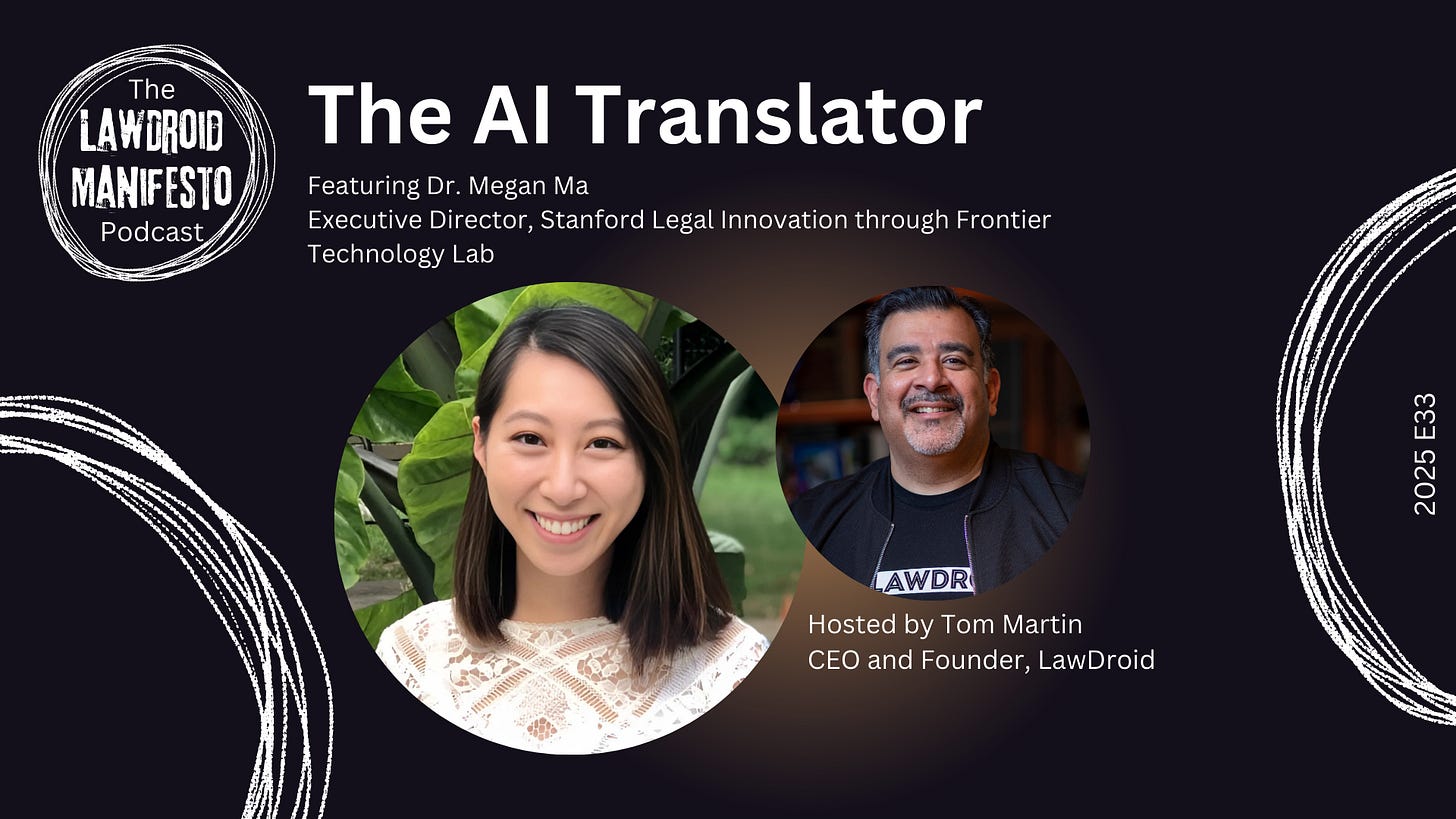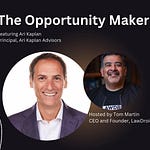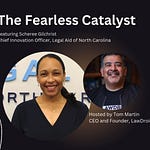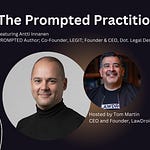Hey there Legal Rebels! 👋 I'm excited to share with you the 33rd episode of the 2025 season of the LawDroid Manifesto podcast, where I will be continuing to interview key legal innovators to learn how they do what they do. I think you're going to enjoy this one!
In this episode, I had the good fortune to interview Dr. Megan Ma. I’ve known Megan now for a few years and I am consistently impressed by her innate ability to translate complex concepts from the world of artificial intelligence. To capture her talent, I have given her the moniker, “The AI Translator.” Her pioneering work at Stanford is not theoretical, but explores practical application of AI to legal practice. Her positive energy is also infectious and I am excited to share our conversation with you.
If you want to understand how AI will truly transform legal practice and education rather than just replace routine tasks, you need to listen to this episode. Megan is at the forefront of bridging AI theory and legal practice, bringing both deep technical understanding and practical implementation experience to help lawyers navigate this transformation.
Defining the Future of Legal AI Through Research and Education
Join me as I interview Dr. Megan Ma, founding Executive Director of Stanford's Legal Innovation Through Frontier Technology Lab (liftlab), whose unique journey from childhood linguistic fascination to cutting-edge legal AI research is shaping how the next generation of lawyers will work with artificial intelligence.
In this insightful podcast episode, Megan shares her remarkable path from growing up in multicultural Toronto with a fascination for language structures to studying at McGill and Sciences Po in Paris, where she wrote groundbreaking research on translating law into computer code. She reveals how her early work on self-driving car regulations taught her that successful AI deployment requires sensitivity to granular jurisdictional differences, a lesson that directly applies to legal AI today. Megan demonstrates how Stanford's Lift Lab is moving beyond theoretical AI applications to create practical tools like DealMentor, an M&A negotiation simulator that brings experiential learning to legal education.
Her insights reveal why the legal profession needs better metrics for evaluating both human and AI performance, drawing powerful parallels between TurboTax's impact on accounting and AI's potential to clarify what truly constitutes high-value legal work. This episode is essential for anyone interested in how AI will reshape legal education, practice evaluation, and the fundamental definition of what lawyers do.
The Skinny
Dr. Megan Ma brings a unique perspective to legal AI that combines childhood fascination with language, international legal education, and cutting-edge technology research. Growing up in multicultural Toronto speaking English, Cantonese, and French, Megan developed an early obsession with how words create meaning, even inventing her own languages as a child. This linguistic foundation led her through McGill University and Sciences Po in Paris, where she wrote pioneering research on translating law into computer code. Her work on Canadian self-driving car regulations taught her that successful AI deployment requires sensitivity to local conditions, like how LED traffic lights would fail in Canadian snow (this was a great example so you’ll have to listen in to the episode to get the full scoop), a lesson she now applies to legal AI development. At Stanford's Lift Lab, Megan focuses on bridging the gap between AI theory and legal practice through four key pillars: evaluation of human vs. AI performance, AI augmentation of legal services, legal education innovation, and new research methods. Her work reveals that lawyers often underperform compared to AI tools in certain tasks while excelling in subjective areas like advocacy and argument coherence.
Key Takeaways:
Childhood fascination with language structure and meaning shaped understanding of AI and legal text
Academic journey from linguistics to law to AI research bridges theory and practice
Self-driving car project revealed importance of contextual deployment over broad generalization
Legal AI success requires personalization and customization rather than one-size-fits-all solutions
Lift Lab research compares human associates directly to AI tools using senior partner evaluations
AI tools sometimes outperform mid-level associates in blind preference tests
TurboTax analogy shows how AI can clarify professional value rather than eliminate it
Legal education needs experiential training that scales mentorship and apprenticeship models
Profession moving toward more empirical and data-driven measures of lawyer effectiveness
Work-life integration requires supportive ecosystem and passion-driven motivation
Notable Quotes:
"I had this strange fascination around language, even at an early age. And partially because I had maybe like a difficulty with trying to reconcile how words are spelled and what they mean." - Megan Ma (00:05:45-00:05:56)
"Real deployment and real adoption requires serious sensitivity around granular points that distinguish our jurisdictions. And I think that's very much the case right now in legal AI." - Megan Ma (00:33:57-00:34:04)
"Everyone is looking for that general purpose legal AI platform. But the things that will really build trust and have lawyers meaningfully use these tools comes from much more of an area of personalization, customization, and understanding how lawyers themselves add value." - Megan Ma (00:34:04-00:34:28)
"When TurboTax was introduced, you didn't necessarily see a bunch of accountants freak out about what TurboTax is going to do to their profession. But the fascinating part about TurboTax is it showcased that there are areas of work from filing your taxes that should be available to everyone." - Megan Ma (00:38:09-00:38:30)
"We uncovered that actually there's quite a bit of work where our human associates had underperformed in comparison to these tools. But, you know, the funny part about it is that, you know, we gave a lot of grace to the humans where you don't necessarily know why they didn't give 100% to the work." - Megan Ma (00:42:20-00:42:36)
"I genuinely feel like it's long overdue how we teach one another. And especially for the legal profession, it's just been primarily focused on really great aspects of mentorship and apprenticeship, but there was no way of evaluating that or there was no way of scaling it." - Megan Ma (00:52:46-00:53:01)
"I think the perception of what the lawyer and the broader legal profession has to offer can be much more empirically driven going forward." - Megan Ma (00:46:43-00:46:47)
"For me, the work is not just a job, so to speak. The work to me is like, everything comes from, you know, an area that's totally passion-driven almost." - Megan Ma (00:49:34-00:49:42)
Clips
How Small Oversights Doom Big Tech Upgrades
Inside a Self-Driving Car Policy Experiment
The Life-Changing Advice at Age 20
How TurboTax Can Set an Example for AI Usage in the Legal Profession
Megan's journey from a curious child inventing languages to leading Stanford's most innovative legal AI lab perfectly captures the evolution of how we think about language, law, and technology. Her early insight that English words have "non-natural associative meaning" compared to pictographic Chinese characters foreshadowed her later work on how AI can help translate between human legal concepts and machine-readable code. The self-driving car story, where California's sunny weather recommendations would have failed catastrophically in Canadian snow, serves as a powerful metaphor for why legal AI must be tailored rather than generalized.
What makes Megan's work particularly compelling is her focus on evaluation and measurement. Rather than assuming AI will simply replace routine legal work, she's actually studying when and how AI outperforms humans, and more importantly, identifying the subjective criteria like advocacy and coherence where human lawyers excel. This empirical approach promises to make the legal profession more transparent and merit-based while preserving the essential human elements that clients value most.
Closing Thoughts
Dr. Megan Ma represents the kind of innovative thinking our profession desperately needs as we navigate the AI transformation. Her unique background, combining deep linguistic understanding, international legal education, and hands-on technology experience, positions her perfectly to bridge the gap between AI theory and legal practice.
What excites me most about Megan's work is her focus on making the legal profession more empirically driven while preserving its essential human elements. Her TurboTax analogy is brilliant: AI doesn't have to threaten lawyers any more than TurboTax threatened accountants. Instead, it can help clarify what truly constitutes high-value legal work and make quality legal services more accessible to everyone.
The work happening at Stanford's Lift Lab, particularly around evaluation metrics and experiential learning tools like DealMentor, is laying the foundation for how legal education and practice will evolve. Megan's insight that successful AI deployment requires local sensitivity rather than broad generalization should guide every legal AI implementation.
For our Legal Rebels community, Megan's story demonstrates that the future belongs to those who can think across disciplines and see connections others miss. Her childhood fascination with language led to groundbreaking work on legal AI, proving that curiosity and passion are often the best predictors of innovation. The legal profession is about to become much more data-driven and performance-based, and leaders like Megan are showing us how to navigate that transition while maintaining the human judgment and advocacy skills that make lawyers irreplaceable.












